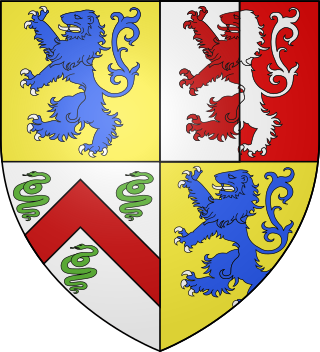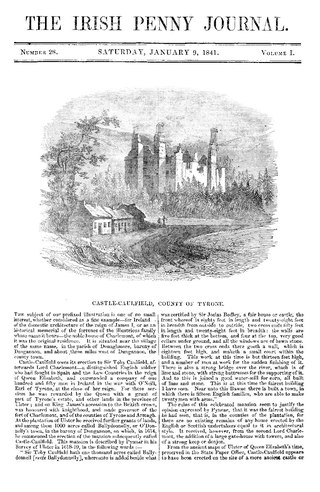McKinnon, MacKinnon or Mackinnon is a Scottish surname.,
McGrath or MacGrath derives from the Irish surname Mac Craith and is occasionally noted with a space: e.g. Izzy Mc Grath. In Ireland, it is pronounced "Mack Grah" "Mick Grah" or "Ma Grah". In Australia and New Zealand it is pronounced MuhGrah.
Mac Diarmada, also spelled Mac Diarmata, is an Irish surname, and the surname of the ruling dynasty of Moylurg, a kingdom that existed in Connacht from the 10th to 16th centuries. The last ruling king was Tadhg mac Diarmata, who ruled until 1585.
Farquhar is a surname of Scottish origin, derived from the Scottish Gaelic fearchar, from fear ("man") and car ("beloved"). Farquharson is a further derivation of the name, meaning "son of Farquhar". The name originated as a given name, but had become established as a surname by the 14th century.
Costello is a surname of Irish origin, which has been used as a stage name by Italians and others.
Cotter is a surname that originates in England and Ireland. It can also be an Anglicization, chiefly in North America, of a similar-sounding German surname.
Dunne or Dunn is an Irish surname, derived from the Irish Ó Duinn and Ó Doinn, meaning "dark" or "brown." The name Dunne in Ireland is derived from the Ó Duinn and the Ó Doinn Gaelic septs who were based in County Laois, County Meath and County Wicklow. These septs in turn are descendants of the O'Regan noble family. It is in these counties that the majority of descendants can still be found. Hundreds of years ago, the Gaelic name used by the Dunn family in Ireland was Ó Duinn or Ó Doinn. Both Gaelic names are derived from the Gaelic word donn, which means "brown". Ó Doinn is the genitive case of donn. First found in county Meath, where they held a family seat from very ancient times. Variations: Dunn, Dunne, Dun, Duen, O'Dunne, O'Doyne, Doine, Doin, O'Dunn.
McCloskey is an Irish surname.

O'Mahony is the original name of the clan, with breakaway clans also spelled O'Mahoney, or simply Mahony, Mahaney and Mahoney, without the prefix. Brodceann O'Mahony was the eldest of the four sons of Mathghamain, known as "The Four Descendants".
MacDonnell, Macdonnell, or McDonnell is a surname of Scottish and Irish origin. It is an anglicized form of the Gaelic patronymic Mac Dhòmhnaill, meaning "son of Dòmhnall". The Gaelic personal name Dòmhnall is a Gaelicised form of the name Donald, which is composed of the elements domno, meaning "world", and val, meaning "might" or "rule". The name is considered a variation of MacDonald.
Nutt is an English surname.
McNutt is a surname of either Scottish or Irish origin. It refers to:
Mackenzie, MacKenzie and McKenzie are alternative spellings of a Scottish surname relating to Clan Mackenzie. It was originally written MacKenȝie and pronounced in Scots, with the "z" representing the old Middle Scots letter, "ȝ" yogh. This is an anglicised form of the Scottish Gaelic MacCoinnich, which is a patronymic form of the personal name Coinneach, anglicized as Kenneth. The personal name means "handsome".
Sheehy is a surname, derived from the Gaelic "Mac Sithigh," which is probably derived from "sithigh," meaning "peace."
Francis is an English surname of Latin origin. Notable people with the surname include:
MacMillan, Macmillan, McMillan, and M'Millan are variants of a Scottish surname; see also the similar surname McMillen. The origin of the name derives from the origin of the Scottish Clan MacMillan. The progenitor of the clan was said to be Airbertach, Hebridean prince of the old royal house of Moray. Airbertach had a son named Cormac, who was a bishop, and Cormac's own son Gilchrist, or in Gaelic, Gille Chriosd, the progenitor of the Clann an Mhaoil, was a religious man like his father. Because of this, Gille Chriosd wore the tonsure, which gave him the nickname Maolan or Gillemaol. As a Columban priest, his head would have been shaved over the front of his head in the style of Saint John the Evangelist, rather than at the vertex of his head. This distinctive tonsure is described in Gaelic as 'Mhaoillan'. The name MacMillan thus literally means, "son of the tonsure".

Donnelly is an Irish surname. Also used as: O’Donnelly or Donley. It is derived from the Gaelic Ó Donnghaile meaning 'descendant of Donnghal', a given name composed of the elements donn and gal ('valour'). O'Donnelly was historically of the Northern Uí Néill's Cenél nEoghain, descended from Donnghal, the great-grandson of Domhnall, King of Ailech.

Bourke is an Anglo-Norman Irish surname, a variant of the surname Burke, deriving from the ancient Anglo-Norman and Hiberno-Norman noble dynasty, the House of Burgh. In Ireland, the descendants of William de Burgh (c.1160–1206) had the surname de Burgh which was gaelicised in Irish as de Búrca and over the centuries became Búrc then Burke and Bourke.
Stanfield is an English surname deriving from the Old English 'stan' and 'feld' (field). This toponymic surname originates from several possible locations in England: the village of Stanfield, Norfolk; the ancient township of Stansfield, West Yorkshire; and the village of Stansfield, Suffolk. Other variants include Stansfield, Stansfeld, and Standfield.
Mostyn is a habitational surname of Welsh origin. It comes from the place Mostyn, in Flintshire, Wales, UK. The village's name was originally derived from Old English mos, meaning 'bog', and tūn, meaning 'farm village'. The name is first recorded in the Flintshire area in the 13th century, in families descended from one of the 15 noble tribes of Wales. In the previous century, there had been lords of the manor of Mostyn, seated at Mostyn Hall. Spelling variations include Mostin, Mostyne, Mosten, and Mostine.


